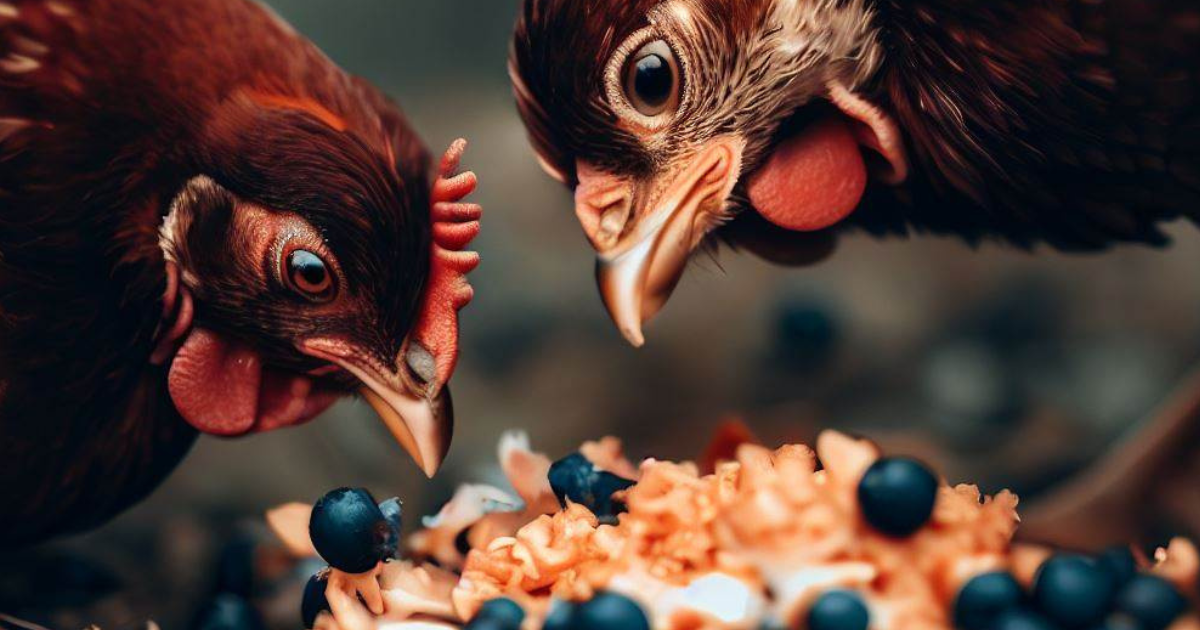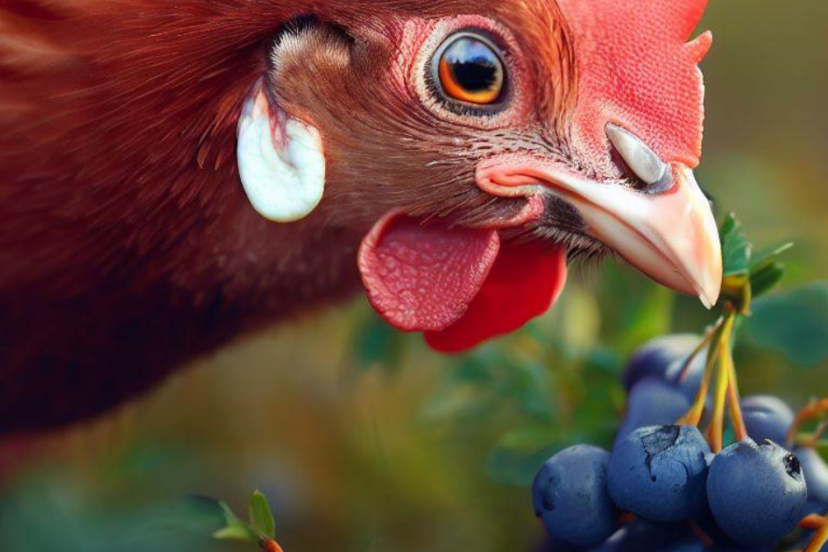Can Chickens Eat Blueberries? Discover Facts, Benefits & Learn Precautions
Curious about feeding blueberries to your chickens? In this article we will dive into the facts, benefits, and precautions into the intriguing topic of feeding blueberries to chickens.
Discussing Potential Health Advantages for Chickens

Now, let’s explore how these nutrients can translate into potential health advantages for our feathered friends:
Boosted Immunity: The vitamin C in blueberries can enhance your chickens’ immune system, helping them stay resilient to common diseases.
Improved Bone Health: Vitamin K is crucial for bone health in chickens, contributing to strong and healthy skeletal structures.
Gut Health: The dietary fiber in blueberries supports digestive health, reducing the risk of digestive issues in chickens.
While blueberries can offer nutritional benefits, they should complement a balanced diet for chickens rather than replace essential elements. However, it’s crucial to be aware of potential risks and practice moderation, which we’ll explore in the following sections.
Nurturing Healthy Chickens: Can Chickens Eat Blueberries?
As a dedicated chicken keeper and enthusiast, I’ve always believed that the key to happy chickens lies in a well-balanced diet. After all, just like us, our feathered friends need a mix of nutrients to thrive and lead fulfilling lives.
The Importance of a Balanced Diet for Chickens
A balanced diet is the cornerstone of good health for chickens. It impacts every aspect of their well-being, from their vibrant feathers to their egg production. But, as with any curious chicken keeper, my mind started wandering into the realm of the unusual – can chickens eat blueberries?
Expressing Curiosity about Feeding Blueberries to Chickens
Blueberries, those tiny, flavorful orbs of goodness, have long been hailed for their health benefits in our diets. But can these little wonders be a tasty and nutritious addition to our chickens’ menu? Join me in exploring this exciting culinary adventure for our feathered companions.
In the following sections, we’ll dive deep into the world of feeding blueberries to chickens. We’ll explore their potential benefits, discuss some precautions, and even share creative ways to incorporate blueberries into their diet. So, join me on this berrylicious journey as we discover if blueberries can truly be a treat for our clucking friends.
Exploring Potential Benefits and Risks
Now, let’s consider how these nutrients can translate into potential benefits for our chickens, as well as any risks that might be involved:
Boosted Immunity: The vitamin C in blueberries can enhance your chickens’ immune system, helping them resist common diseases.
Improved Bone Health: Vitamin K is crucial for bone health in chickens, contributing to strong and healthy skeletal structures.
Gut Health: The dietary fiber in blueberries can support digestive health, reducing the risk of digestive issues.
While blueberries hold promise as a nutritious treat, they should be introduced in moderation and not replace the core elements of a chicken’s diet. Additionally, it’s essential to consider potential risks, which we’ll explore further in this article.
Benefits of Feeding Blueberries to Chickens

Highlighting Vitamins and Minerals in Blueberries
Let’s start by shining a spotlight on the essential vitamins and minerals found in blueberries:
Vitamin C: Similar to Oranges, Blueberries are a good source of vitamin C, known for its immune-boosting properties. For chickens, a robust immune system can mean better resistance to diseases.
Vitamin K: Vital for blood clotting and bone health, vitamin K contributes to strong and healthy bones in your flock.
Dietary Fiber: Blueberries are rich in dietary fiber, which is essential for promoting healthy digestion in chickens.
Discussing Potential Health Advantages for Chickens
Now, let’s explore how these nutrients translate into potential health advantages for our feathered friends:
Boosted Immunity: Vitamin C is a powerful antioxidant that can enhance your chickens’ immune system, making them more resilient to common diseases.
Improved Bone Health: Vitamin K plays a vital role in bone health, contributing to strong and sturdy skeletal structures in chickens.
Enhanced Digestion: The dietary fiber in blueberries supports healthy digestion in chickens, reducing the risk of digestive issues.
While blueberries offer promising benefits, they should be regarded as a supplementary treat in your chickens’ diet. Remember that variety is key to a balanced diet, and blueberries should complement their regular feed and other essential nutrients. However, it’s also essential to be aware of potential risks and practice moderation, which we’ll explore in the next section.
Risks and Precautions: Can Chickens Eat Blueberries?
Now, let’s address the flip side of the blueberry equation – the potential risks and the crucial role of moderation. As a dedicated chicken keeper, I believe in informed choices when it comes to our feathered friends’ diet.
Exploring Possible Issues with Blueberry Consumption
While blueberries offer enticing benefits, it’s important to consider some potential issues when feeding them to chickens:
Pesticide Residues: Like many fruits, blueberries may carry traces of pesticides used in cultivation. To mitigate this risk, ensure you thoroughly wash and clean the blueberries before offering them to your chickens.
Natural Sugars: Blueberries contain natural sugars. Excessive consumption of sugary treats can lead to weight gain and other health issues in chickens. It’s vital to introduce blueberries in moderation.
Digestive Concerns: Blueberries are also rich in dietary fiber, which can be beneficial for digestion. However, an excess of fiber can cause digestive discomfort or diarrhea in chickens. Be mindful of the quantity you offer.
Offering Advice on Moderation
To ensure the safety and well-being of your flock, it’s essential to follow these guidelines when introducing blueberries into their diet:
Thorough Cleaning: Always rinse blueberries thoroughly to remove any potential pesticide residues or contaminants. A clean berry is a safer berry.
Moderation is Key: As with any treat or supplement, moderation is crucial. Start by offering small portions of blueberries and gradually increase the amount as you observe how your chickens react.
Varied Diet: Blueberries should not replace the core elements of a chicken’s diet. Ensure that your chickens receive a well-balanced and diverse menu.
By exploring the potential risks and practicing moderation, you can safely incorporate blueberries into your chickens’ diet while minimizing any potential issues. Remember, a balanced and varied diet is the key to keeping your feathered friends happy and healthy.
How to Feed Blueberries to Chickens

Now that we’ve established that blueberries can be a nutritious treat for your flock, let’s dive into the practical aspects of serving these little blue gems safely and even get a bit creative with their incorporation into your chickens’ diet.
Sharing Practical Tips on Serving Blueberries Safely
1. Wash Thoroughly: Before serving blueberries, give them a good rinse under running water. This step is essential to remove any potential pesticide residues or contaminants.
2. Chop or Mash: Blueberries can be quite large for chickens to handle. Consider chopping them into smaller pieces or mashing them slightly to make them more manageable for your feathered friends.
3. Start Small: As with any new treat, it’s crucial to introduce blueberries gradually. Begin with a small quantity and observe how your chickens react. Some may adore them, while others might be more hesitant.
4. Monitor Digestion: Keep an eye on your chickens’ digestive health when introducing blueberries. If you notice any signs of digestive discomfort or diarrhea, reduce the quantity in their diet.
Offering Creative Ideas for Incorporating Blueberries into Their Diet
1. Mixed with Regular Feed: One simple way to introduce blueberries is by mixing them with your chickens’ regular feed. This familiarity with their regular food can encourage them to try the blueberries.
2. Blueberry Kabobs: Thread small pieces of blueberries onto a string or skewer, creating a chicken-friendly kabob. Hanging these in the coop can provide both entertainment and a tasty snack.
3. Frozen Treats: Freeze blueberries in ice cubes and offer them to your chickens on hot summer days. This refreshing treat can help keep them cool while adding some variety to their diet.
4. Mash and Mix: Mash blueberries and mix them with other kitchen scraps or leftovers. This can create a flavorful and nutritious concoction for your chickens.
By following these practical tips and getting creative with how you serve blueberries, you can ensure that your chickens enjoy this unique treat while maintaining their safety and overall well-being. Remember, variety in their diet can make mealtime more exciting for your feathered friends.
Closing remarks: Can Chickens Eat Blueberries?
As we wrap up our exploration of whether chickens can enjoy blueberries, let’s take a moment to summarize what we’ve learned and emphasize the importance of maintaining a balanced diet for our feathered friends.
Summarizing the Key Points
Blueberries are packed with beneficial nutrients like vitamin C, vitamin K, and dietary fiber, which can contribute to improved immunity, bone health, and digestion in chickens.
While they offer numerous advantages, blueberries should be introduced in moderation, considering potential risks like pesticide residues, natural sugars, and digestive concerns.
Practicing moderation and ensuring a well-rounded diet for your chickens is key to safely incorporating blueberries into their menu.
Emphasizing the Importance of a Balanced Diet for Chickens
While treats like blueberries can add excitement to their meals, they should always complement their regular feed, which is carefully formulated to meet their specific nutritional needs.
Remember that chickens rely on us for their well-being, and maintaining a balanced diet is a responsibility we should take seriously. It ensures they receive the essential nutrients required for strong bones, vibrant feathers, and optimal egg production.
So, as you introduce blueberries or any other treats to your flock, keep their well-being in mind. By providing a variety of foods while ensuring moderation, you can keep your chickens clucking contentedly, and that’s what every chicken keeper aspires to achieve. Happy chicken keeping!
FAQs
Now, let’s address some common questions about feeding blueberries to chickens. If you’re curious or seeking guidance on this berrylicious treat, you’re in the right place.
1. Can chickens eat all types of blueberries?
Yes, chickens can generally eat all varieties of blueberries, including cultivated and wild ones. However, it’s essential to ensure that the blueberries you provide are ripe, fresh, and free from any mold or spoilage. Chickens can be picky eaters, so some may prefer one type over another, but there’s no strict limitation on the variety.
2. How should I prepare blueberries for my chickens?
To prepare blueberries for your chickens, consider mashing or chopping them into smaller pieces. This makes it easier for chickens to consume without any choking hazards. You can also offer them whole, but be attentive to how your chickens handle them. Fresh and washed blueberries are the best choice, as they maintain their nutritional value.
3. How often can I feed blueberries to my chickens?
While chickens can enjoy blueberries, they should be fed in moderation. Blueberries should be considered an occasional treat and not a daily staple. A small handful for each chicken a few times a week is generally sufficient. Remember, moderation helps prevent any potential digestive issues.
4. Are there any signs of blueberry poisoning in chickens?
Blueberry poisoning in chickens is extremely rare. However, if a chicken consumes a large quantity of blueberries in a short period, it may experience digestive upset, such as diarrhea. To prevent this, always offer blueberries in moderation, and observe your flock for any unusual behavior or symptoms.
5. Can blueberries improve egg quality?
Blueberries are rich in antioxidants, which can have positive effects on overall health, including the health of your chickens’ feathers and skin. While there’s no direct evidence that blueberries significantly improve egg quality, providing a varied diet with occasional treats like blueberries can contribute to your chickens’ overall well-being. Healthy, happy chickens tend to lay better-quality eggs.
*We may earn a commission from purchases made through our links, at no cost to you. This does not affect our product recommendations. Please see our disclosure to learn more.




